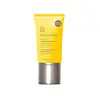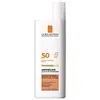What's inside
What's inside
 Key Ingredients
Key Ingredients

 Benefits
Benefits

 Concerns
Concerns

 Ingredients Side-by-side
Ingredients Side-by-side

Water
Skin ConditioningZinc Oxide
Cosmetic ColorantCaprylic/Capric Triglyceride
MaskingDimethicone
EmollientDicaprylyl Carbonate
EmollientCoco-Caprylate/Caprate
EmollientButyloctyl Salicylate
Skin ConditioningPropanediol
SolventLauryl Polyglyceryl-3 Polydimethylsiloxyethyl Dimethicone
Skin ConditioningPolyhydroxystearic Acid
EmulsifyingPolymethylsilsesquioxane
Tranexamic Acid
AstringentAloe Barbadensis Leaf Juice
Skin ConditioningHibiscus Sabdariffa Flower Extract
Skin ConditioningPongamia Pinnata Seed Extract
Skin ConditioningSaccharide Isomerate
HumectantSodium Hyaluronate
HumectantEthylhexylglycerin
Skin ConditioningDimethicone/Polyglycerin-3 Crosspolymer
CleansingMagnesium Hydroxide
AbsorbentTriethoxycaprylylsilane
Magnesium Sulfate
Disteardimonium Hectorite
StabilisingSodium Chloride
MaskingTriethyl Citrate
MaskingSodium Citrate
BufferingTetrasodium Glutamate Diacetate
Phenoxyethanol
PreservativePotassium Sorbate
PreservativeWater, Zinc Oxide, Caprylic/Capric Triglyceride, Dimethicone, Dicaprylyl Carbonate, Coco-Caprylate/Caprate, Butyloctyl Salicylate, Propanediol, Lauryl Polyglyceryl-3 Polydimethylsiloxyethyl Dimethicone, Polyhydroxystearic Acid, Polymethylsilsesquioxane, Tranexamic Acid, Aloe Barbadensis Leaf Juice, Hibiscus Sabdariffa Flower Extract, Pongamia Pinnata Seed Extract, Saccharide Isomerate, Sodium Hyaluronate, Ethylhexylglycerin, Dimethicone/Polyglycerin-3 Crosspolymer, Magnesium Hydroxide, Triethoxycaprylylsilane, Magnesium Sulfate, Disteardimonium Hectorite, Sodium Chloride, Triethyl Citrate, Sodium Citrate, Tetrasodium Glutamate Diacetate, Phenoxyethanol, Potassium Sorbate
Water
Skin ConditioningIsododecane
EmollientC12-15 Alkyl Benzoate
AntimicrobialDimethicone
EmollientUndecane
EmollientTriethylhexanoin
MaskingIsohexadecane
EmollientStyrene/Acrylates Copolymer
Nylon-12
Caprylyl Methicone
Skin ConditioningButyloctyl Salicylate
Skin ConditioningPhenethyl Benzoate
EmollientSilica
AbrasiveTridecane
PerfumingDicaprylyl Carbonate
EmollientDicaprylyl Ether
EmollientTalc
AbrasiveDimethicone/PEG-10/15 Crosspolymer
Aluminum Stearate
Cosmetic ColorantPentylene Glycol
Skin ConditioningC9-15 Fluoroalcohol Phosphate
Skin ConditioningTocopherol
AntioxidantPhenoxyethanol
PreservativeStearic Acid
CleansingDiethylhexyl Syringylidenemalonate
Skin ProtectingPEG-9 Polydimethylsiloxyethyl Dimethicone
EmulsifyingMagnesium Sulfate
PEG-8 Laurate
EmulsifyingPEG-9
HumectantPolyhydroxystearic Acid
EmulsifyingMaltodextrin
AbsorbentBenzoic Acid
MaskingIron Oxides
Propylene Glycol
HumectantPropylene Carbonate
SolventCaprylyl Glycol
EmollientDisteardimonium Hectorite
StabilisingCassia Alata Leaf Extract
AstringentAlumina
AbrasiveAluminum Hydroxide
EmollientWater, Isododecane, C12-15 Alkyl Benzoate, Dimethicone, Undecane, Triethylhexanoin, Isohexadecane, Styrene/Acrylates Copolymer, Nylon-12, Caprylyl Methicone, Butyloctyl Salicylate, Phenethyl Benzoate, Silica, Tridecane, Dicaprylyl Carbonate, Dicaprylyl Ether, Talc, Dimethicone/PEG-10/15 Crosspolymer, Aluminum Stearate, Pentylene Glycol, C9-15 Fluoroalcohol Phosphate, Tocopherol, Phenoxyethanol, Stearic Acid, Diethylhexyl Syringylidenemalonate, PEG-9 Polydimethylsiloxyethyl Dimethicone, Magnesium Sulfate, PEG-8 Laurate, PEG-9, Polyhydroxystearic Acid, Maltodextrin, Benzoic Acid, Iron Oxides, Propylene Glycol, Propylene Carbonate, Caprylyl Glycol, Disteardimonium Hectorite, Cassia Alata Leaf Extract, Alumina, Aluminum Hydroxide
 Reviews
Reviews

Ingredients Explained
These ingredients are found in both products.
Ingredients higher up in an ingredient list are typically present in a larger amount.
Butyloctyl Salicylate is a chemical UV filter structurally similar to octisalate. It is a photostabilizer, SPF booster, emollient and solvent. This ingredient helps evenly spread out ingredients.
According to a manufacturer, it is suitable for pairing with micro Titanium Dioxide, Zinc Oxide, and pigments.
Photostabilizers help stabilize UV-filters and prevents them from degrading quickly.
Learn more about Butyloctyl SalicylateDicaprylyl Carbonate comes from carbonic acid and caprylyl alcohol, a fatty alcohol. It is an emollient and gives skin a velvet feel. The sources of Dicaprylyl Carbonate may be synthetic or from animals.
As an emollient, Dicaprylyl Carbonate creates a film on the skin. This film traps moisture in, keeping your skin soft and hydrated.
Dimethicone is a type of synthetic silicone created from natural materials such as quartz.
What it does:
Dimethicone comes in different viscosities:
Depending on the viscosity, dimethicone has different properties.
Ingredients lists don't always show which type is used, so we recommend reaching out to the brand if you have questions about the viscosity.
This ingredient is unlikely to cause irritation because it does not get absorbed into skin. However, people with silicone allergies should be careful about using this ingredient.
Note: Dimethicone may contribute to pilling. This is because it is not oil or water soluble, so pilling may occur when layered with products. When mixed with heavy oils in a formula, the outcome is also quite greasy.
Learn more about DimethiconeDisteardimonium Hectorite comes from the clay mineral named hectorite. It is used to add thickness to a product.
It can also help stabilize a product by helping to disperse other ingredients.
Hectorite is a rare, white clay mineral.
Learn more about Disteardimonium HectoriteMagnesium Sulfate is a salt. More specifically, it is an epsom salt, or the bath salt used to help relieve muscle aches.
Despite having ‘sulfate’ in the name, it isn’t a surfactant or cleansing agent like sodium lauryl sulfate. Unlike those sulfates, magnesium sulfate doesn’t have the same cleansing or foaming properties (it's simply a type of salt).
In cosmetics, Magnesium Sulfate is used to thicken a product or help dilute other solids. It is a non-reactive and non-irritating ingredient.
One study shows magnesium deficiency may lead to inflammation of the skin. Applying magnesium topically may help reduce inflammation.
You can find this ingredient in sea water or mineral deposits.
Learn more about Magnesium SulfatePhenoxyethanol is a preservative that has germicide, antimicrobial, and aromatic properties. Studies show that phenoxyethanol can prevent microbial growth. By itself, it has a scent that is similar to that of a rose.
It's often used in formulations along with Caprylyl Glycol to preserve the shelf life of products.
Polyhydroxystearic Acid is a soft wax made from castor oil.
It is is a texture thickener, emulsifier, and film-former. Emulsifiers prevent ingredients from separating, such as oils and waters.
Polyhydroxystearic Acid may not be fungal acne safe.
Learn more about Polyhydroxystearic AcidWater. It's the most common cosmetic ingredient of all. You'll usually see it at the top of ingredient lists, meaning that it makes up the largest part of the product.
So why is it so popular? Water most often acts as a solvent - this means that it helps dissolve other ingredients into the formulation.
You'll also recognize water as that liquid we all need to stay alive. If you see this, drink a glass of water. Stay hydrated!
Learn more about Water